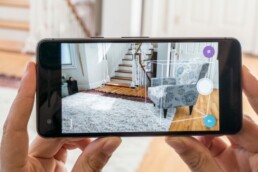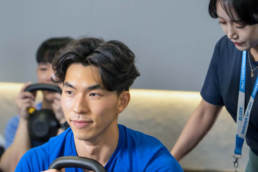Eye Care startups in Korea are leading the way in the emerging field of eye healthcare technology. They are disrupting the ophthalmology industry by offering new technologies to detect and treat common eye diseases such as glaucoma, diabetic retinopathy, and age-related macular degeneration. The ophthalmology industry is a large and growing market because there is a need for people worldwide. Below are a few eye care startups in Korea to watch for as they continue to disrupt the ophthalmology industry.
Eye Care Startups in Korea
RUDACARE

RUDACARE is a biotech startup in Korea focusing on ocular disease. They have partnered with Hanlim Pharmaceuticals to develop and distribute its drug candidate for Dry Eye Disease. It is called RCI001 and got approvals for both phase 1 clinical trials in Korea and phase 2 clinical trials in the United States in 2022. To date, the eye care startup in Korea has raised $16.5 million in its Series A round.
Nu Eyne
 Korean medical device startup Nu Eyne is one of the few IoT Healthcare startups in Korea to go to CES. The startup focuses on treating ophthalmological disorders. These disorders could be dry eye syndrome or simple eye discomfort. Furthermore, they treat these disorders by applying tissue engineering and neuro-modulation technology.
Korean medical device startup Nu Eyne is one of the few IoT Healthcare startups in Korea to go to CES. The startup focuses on treating ophthalmological disorders. These disorders could be dry eye syndrome or simple eye discomfort. Furthermore, they treat these disorders by applying tissue engineering and neuro-modulation technology.
Some of their other devices include:
- Personal wearable medical devices treat corneal diseases, such as DES, by inducing nerve normalization.
- Wearable medical devices promote nerve generation for treating retinal diseases, such as glaucoma and macular dystrophy.
- Personal wearable medical device to induce and maintain sleep for ASD and ADHD patients.
- A wearable medical device that induces a strong electric field to inhibit unregulated proliferation.
Tomocube
 Korean AI BioTech startup Tomocube creates real-time 3D imaging products for optical solutions and developed a diagnosis program that combines 3D holographic microscopy and AI technology. Furthermore, their platform allows researchers to measure nanoscale, real-time, dynamic images of individual living cells without the need for sample preparation. Their main product, a microscope called HT-1, measures 3D refractive index tomograms of live cells and tissues. Therefore, this allows for high-resolution 3D refractive index tomograms of cells. This is important in showing the development of apoptotic features in early Parkinson’s disease (PD) progression. Therefore, this technology allows researchers to conduct long-term studies without the fear of photobleaching and phototoxicity impacting their results.
Korean AI BioTech startup Tomocube creates real-time 3D imaging products for optical solutions and developed a diagnosis program that combines 3D holographic microscopy and AI technology. Furthermore, their platform allows researchers to measure nanoscale, real-time, dynamic images of individual living cells without the need for sample preparation. Their main product, a microscope called HT-1, measures 3D refractive index tomograms of live cells and tissues. Therefore, this allows for high-resolution 3D refractive index tomograms of cells. This is important in showing the development of apoptotic features in early Parkinson’s disease (PD) progression. Therefore, this technology allows researchers to conduct long-term studies without the fear of photobleaching and phototoxicity impacting their results.
Tomocube has worked closely with the top technical university in Seoul, Korea Advanced Institute of Science and Technology (KAIST). They are working together to develop the custom stitching software for the motorized stage.
Winner of the Innovation Award
The Tomocube HT2 holographic microscope is the world’s first microscope to combine both holography and 3D imaging into one unit. In addition, It can capture high-resolution 3D optical diffraction tomography and 3D images simultaneously.
“We, as the first mover in the 3D holographic image industry, feel a great sense of responsibility and burden to move ahead at the same time. But I believe we can and will grow even more to give benefits to the medical industry and patients by releasing innovative products,” said the CEO of Tomocube Hong Ki-hyun.
M2S
 Korean medical startup M2S is the developer of a compact ophthalmological exam device using VR technology. Their solution is called VROR (Virtual Reality Ophthalmic Room), it is a VR HMD eye exam device that can be used in clinics and hospitals. It reduces the need for more devices, space, or manpower. It is quicker for patients and cheaper.
Korean medical startup M2S is the developer of a compact ophthalmological exam device using VR technology. Their solution is called VROR (Virtual Reality Ophthalmic Room), it is a VR HMD eye exam device that can be used in clinics and hospitals. It reduces the need for more devices, space, or manpower. It is quicker for patients and cheaper.
Medipixel
![]()
Medipixel is the creator of Medipixel XA, an automated cardiovascular vessel analysis program. It does quantitative coronary analysis of not only main vessels but also side branches of a patient’s coronary arteries.
Meidpixel received over $8 million for their Series A round and has already conducted clinical trials with large hospitals in Korea such as Asan Medical Center and Seoul National University Bundang Hospital.
Popular
Related Posts
Veterinary Startups in Korea – Animal Healthcare Startups
October 31, 2023
Fitness Startups in Korea on the Rise
March 15, 2024
Freight service startups in Korea for Cargo Transportation
January 17, 2024






